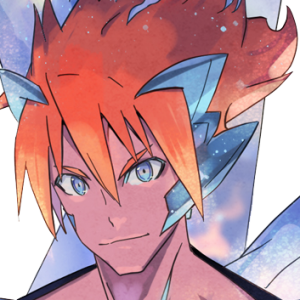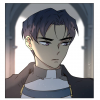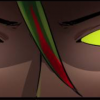Last time we left Jinsei, he, Seven and Weret were sparring in a battle that became personal as their inability to overcome the wrongs of the past or accept the hand they had been dealt spurred them to place the focus of their pain on the other party. Weret blinded by her hatred of the empire drove a hard fight against Jinsei who with his back pinned against the wall had to face his inner demons and take up the sword he had been avoiding. The sword that represented his PTSD trigger over his father’s death at his own hand. The sword that brought his frustration to the surface. For all purposes, Seven may as well have not existed as these personalities clashed.
Episode forty-five, takes not a moment for pause and dives right back into the clashing personalities only this time, the focus has shifted, it is no longer about the pent up rage Weret caries aimed at an emotionally wounded Jinsei. No, this episode is focused on Jinsei and memories of that day, of his crumbling belief in the empire he knew, and the monster that lurks in its shadow. It is an episode where we see Jinsei face the gut-wrenching truths that have been revealed to him, where he finally takes the first true steps on his path.
Jinsei vs Weret… round 2
Forty-five opens with a recap of the final moments of forty-four, Weret has Jinsei beaten, her Khopesh is trained at Jinsei, at any moment she could strike and end him there.
This sword originated from the lands I grew up in. The very lands… Your father fucked over.
Weret to Jinsei
That Weret would disregard Jinsei’s words comes at no surprise, but what I find curious is Marius. There is little emotion on his face bar the slight twitch of his lip that indicates displeasure. It is of no surprise given the hostility Weret is showing and her blatant and obvious disregard for the rules he has set… and yet despite a few un-tempered strikes, she hasn’t actually made a move to kill Jinsei despite her blind dislike of him. If anything her eyes and face say she is unconvinced and wants to test his mettle more. Perhaps deep down she knows he is not her enemy?
Rather than strike Jinsei down, she gestures for him to pick up his sword. Her face is a plain mask of displeasure, a calculated look in her eye. As Seven moves to intervene, or join in, Marius stops him.
“This one you should sit out of. This Match is more… Personal”
This sequence is really effective, we see the immediate effect of his PTSD episode. From the moment. The flashback of the moment he stabs his father hits the moment he touches the hilt of the sword. Though we cannot clearly see the words his father is speaking, it appears as though he is saying “I’m… you,” I think this is perhaps his subconscious mind-twisting the memory. The final panel really highlights the physical burden the PTSD flashback has on him. He is squinting his eyes, and shaking whether from the impact of the PTSD evoked memory or an attempt to shut it ut is unclear. But either way, the experience does not look pleasant. For all purposes, it is uncovering of the physical and mental trauma that we have seen alluded to in past episodes. While this revelation does not come as a shock, it is clear that not only is it real, but it cuts deeply into Jinsei. This is the burden has been shouldering alone. The segment ends with Jinsei giving himself a shake. A literal representation of him pushing aside the PTSD episode,it would see, whatever truths are hidden within the memory, he still is not ready to face it, and perhaps, never will be.
“Whatever the Empire has done to your village is probably unforgivable. But I am sor–“
Jinsei to Weret
Jinsei’s apology falls on deaf ears before he is even able finish bringing it into being as Weret goes on the offensive. This is not an unsurprising reaction. Weret is blinded by her hate for the empire, for Jinsei. She cannot see beyond the things that happened in the past, it is what drove the energy of their battle to turn from a training match to something more akin to war.
One of the strongest aspects of this series of panels is that even in the face of Werets unmitigated rage, Jinsei still finds the inner strength to look Weret in the eye. The intensity of their fight elicits a wince from Marius and condemnation of his battle prowess. Jinsei’s head simply is not in the fight and he is getting easily overwhelmed, something that doesn’t sit right with an heir to the empire. At the very least he shouldn’t be wilting afore Werets unyielding rage.
“This very village you’re taking refuge in… is the same one that took me in as family. And you were the one that issued Empire scum to take it over. To steal even more Spirit Coins. But I’ll be dammed if I let anyone else bring harm to this village…
Weret

Finally we get to the source of Weret’s hatred of Jinsei. She attributes his fathers crimes to Jinsei, but also blames him for what General Pisca and Davies did because ultimately, they were there under his orders, so while he may not have been aware of their actions. He was responsible in the eyes of Weret because he was the face of the empire that dispatched them there. From a logical standpoint it makes sense, even if placing the blame on Jinsei seems misguided at best. More telling is that in this moment, Jinsei fails to meet her eyes and instead pins his eyes to the ground. In what would seem to be an admission of guilt. The PTSD flashback, showing his fathers face appears again. There is some dialogue attributed to the empire, but to Jinsei it is nothing more than a wiggly line signifying he cannot remember what was said.
And then like a river breaking a damn…..
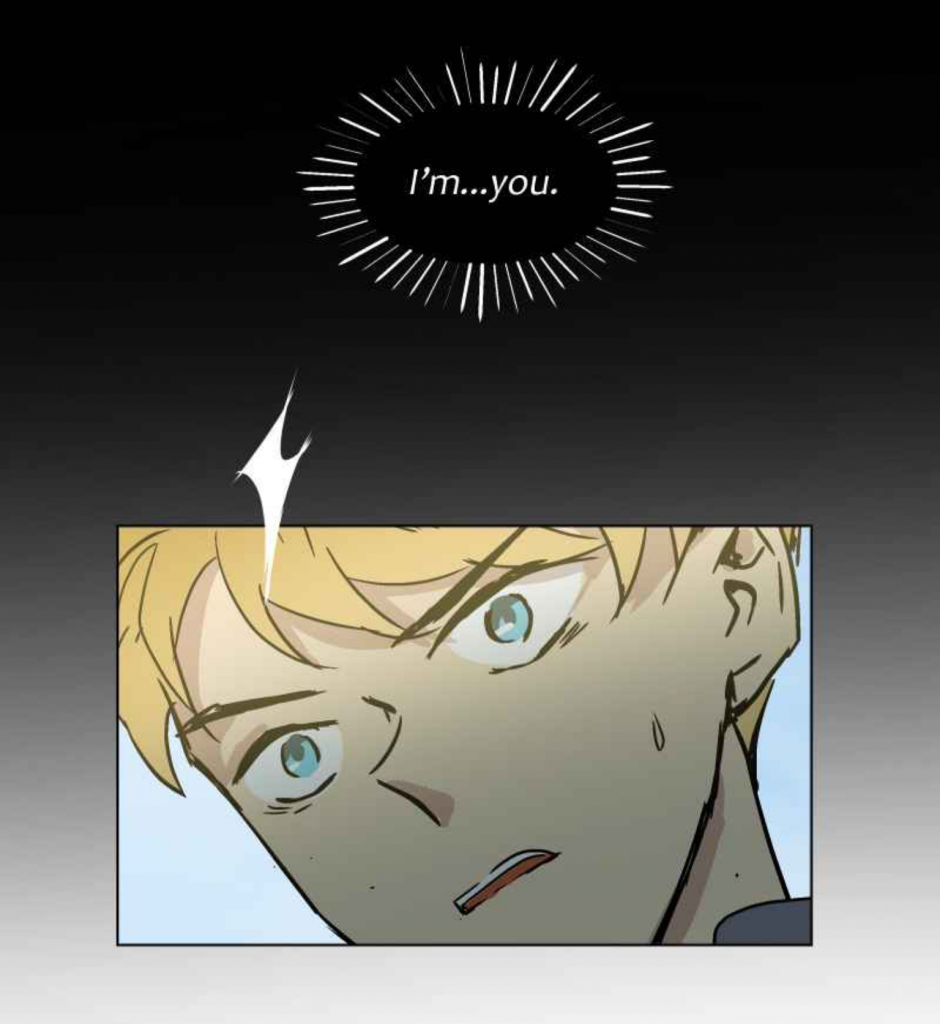
.,.. the moment of clarity that Jinsei has needed happens. The shock of realisation is written on his face.

Hi rejection of the PTSD memory is poignant and important. He braces himself as Weret attacks, only this time where before he was easily overwhelmed, his stance is firm and he holds his ground, determination fills his eyes as he faces Weret. The PTSD memory arises once more, revealed only with the “I’m you.” But Jinsei has already moved on and perhaps for the first time since the day he killed his father, he has clarity.
“I’m not him!”
He counters Weret’s incoming strike with the force of his newfound conviction, or perhaps he is tired of people accusing him of being something he clearly is not. With a clean strike, he knocks Weret’s khopesh away. It is a clear dual metaphor for the personal battle between them and the internal war Jinsei is waging.
Weret goes on the defensive, and despite being disarmed manages to upend Jinsei face down in the dirt. While remarkable, it is what she does next that truly shows the essence of her character.
“I don’t know why the professor would trust someone like you. But if he believes you can help us overthrow the Empire… You’ve got to do better than get your ass kicked in a mere training session!”
Weret
Weret’s words are important because it not only reveals her goals, but also her tenacity. Somehow, the blind hate that was displayed previously has gone and in its place is an uncertain challenge to Jinsei. Weret is revealing what her goal is, but also telling him she has found him wanting. Though it doesn’t appear to be meant in a vindictive fashion, but rather an oddly supporting one. I think there is also a dual meaning to her words, beyond the direct meaning she – at least to me – appears to be saying, prove your words, but to do that you need to better.
Memories of that day & the Shadow of the past
The next series of panels is simply breathtaking and is one of those that i truly believe should be seen organically to truly see its beauty. It is by far one of my favourite sequences within the series so far and is a work of pure genius.
Here we see Jinsei as he is now, brought to his knees and burdened by the shadows of his past. The purple shadows bleed downwards, transcending the present to show us a tragic scene. The emperor, Jinsei and Sumire are stood before a black coffin surrounded by a field of golden flowers. Though the three stand side by side, the emperor seems to be alone, unsupported, while Jinsei and Sumire have each other, signified by the holding of their hands. The golden and purple that surrounds them is blinding and contrasts against the black coffin, somehow it seems to signify a light in their world going out.
The inclusion of this history I think is poignant, it shows us more of who the emperor and Jinsei are, and perhaps one of Jinsei’s deep-held regrets. The sheer grief that emanates from the Emperor is palpable and is an indication perhaps of where the Empire went wrong. I am reminded of the Ideology that Jinsei thought the Empire stood for…
I find Jinsei’s words sorrowful, the shifting colours and the juxtaposition of red and white, seem to simultaneously infer the emperor’s anger and hatred alongside the raw pain within Jinsei. Reading this part made me see Jinsei in a new light, see the arrogance for what it was: a facade to his hide his vulnerability. the mirroring of the emperor against the upside-down profile of Jinsei’s mother seems to signify the deviation of their paths, and the bitterness that her death instilled in Jinsei’s father. Somehow, I think that perhaps the Emperor was searching for something beyond power in the Spirit coins. The question remains to why he hated old World natives… it seems illogical. But then, grief does not follow any logic. Perhaps he couldn’t bear to see them because they reminded him of who he had lost?
The transition from dwelling on the Emperor and his goals to Jinsei and his relationship with Katsurou is important. It shows us Jinsei’ innermost thoughts around Katsurou and the acknowledgement that at a level, he hated Katsurou because he was the catalyst that first opened Jinsei to the possibility the view he had of the Empire was fundamentally wrong. It also indicates just how strong Jinsei is as a person. He hated Katsurou and yet he came to see that Katsurou was right, he acknowledges that he himself was wrong. The ending highlights something integral about Katsurou, despite him proving that Jinsei was wrong on a lot of things he also wants Jinsei to succeed his father as Emperor, ultimately, proving that for Katsurou, Jinsei is the right person to make changes for the better. That Jinsei questions why is important because it indicates how he views himself and suggests that Jinsei himself does not feel he is not worthy.
Ending with the juxtaposition of Jinsei today with the Jinsei of the past is a brilliant piece. Firstly because it is a reminder that Jinsei is looking back at his past, at himself. But also because it shows the growth of character and the change that Jinsei has gone through. In the past Jinsei stood resolute while now he is on his knees, his eyes are open to the truth and while it has wounded him, he is still determined. It speaks of his inner strength and perhaps offers a glimpse of what Katsurou sees in him.
The death of the Emperor has been central to Cape of Spirits, on multiple occasions we have seen glimpses of what happened on that day, we have seen the uncertainty that has followed him since that day. This is a moment that finally shines a light on what happened and shows the empire in a light heretofore unseen. We finally see how the Emperor saw Jinsei and it is surprising. Given what Jinsei has said earlier in this Episode it would appear whatever shadow had clouded the Emperor’s vision was dispelled by Jinsei as he died and his final words are heartfelt and impactful.
Finally, Jinsei acknowledges his feeling, the feeling behind this episode is immense. It is a good resolution to the introspective focus. The single tear is probably the first strong piece of emotion beyond anger and frustration we have seen Jinsei exhibit. It is important because it signifies Jinsei’s acceptance of his role in his father’s death, and him finally allowing himself to move past the trauma and allow himself to grieve. The tear could also symbolise relief that his final words with his father were not what he thought, instead of an angry accusation he got calm acceptance and a confirmation that Jinsei was not to blame for the actions of his father and the Empire.
Back in the present Jinsei grips his sword, the same one that elicited a PTSD reaction previously, only this time there is nothing. Instead we see the measure of Jinsei’s strength as it now a declaration that he believes in.
“Weret… Even though my words are meaningless to you…My actions will prove otherwise.”
Jinsei
Weret’s reactions clearly shows where she is. While she does not outright reject Jinsei’s declaration she goes on the attack.
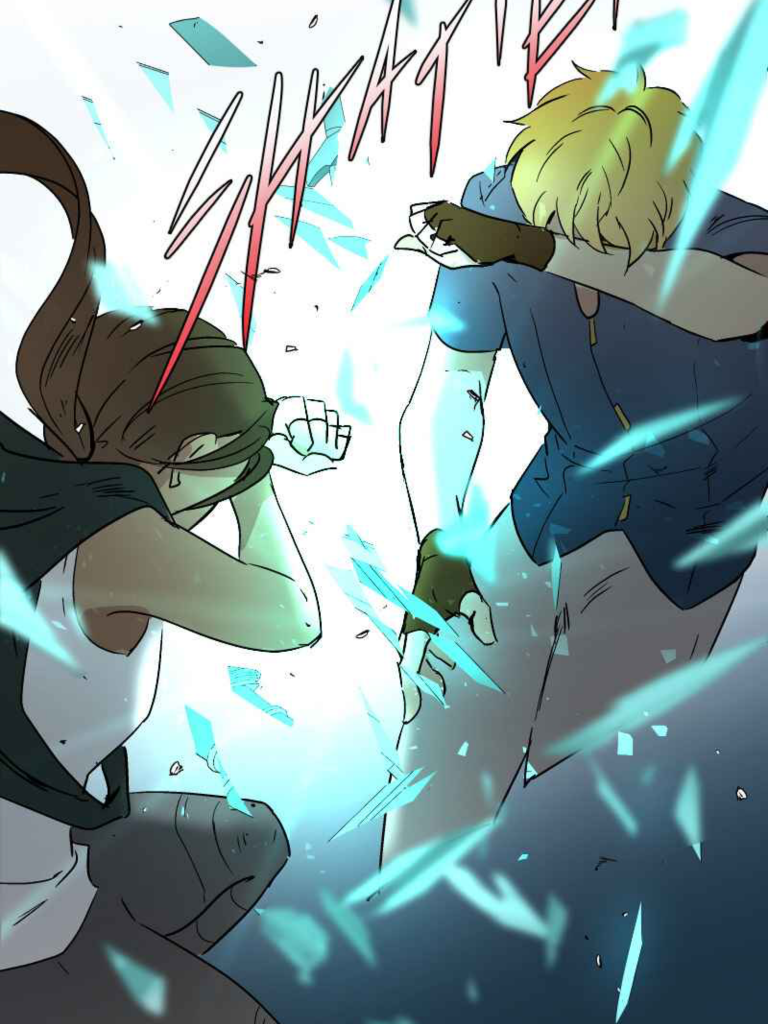
With a solid purpose and determination, Jinsei finally brings his true strength to the field, the intensity of which shatters both his and Weret’s blades. I like to think that it is a sign that in acknowledging the past he has found the inner strength to overcome Weret. However the shattering of the blades could signify two things.
First that Jinsei and Weret’s strength is closely matched and one being unable to the fully subdue the other resulted in the shattering. the second possibility is that it is a representation of the intensity of their clash and the clashing spirits of their resolve.
The shattered blades are used as a means to transition the the scene to a familiar figure, the spirit Katsurou who floats isolated in the spirit world. It would seem he is waiting for something. As we see a closeup of his face, it seems that he is weakened or perhaps it is sick.
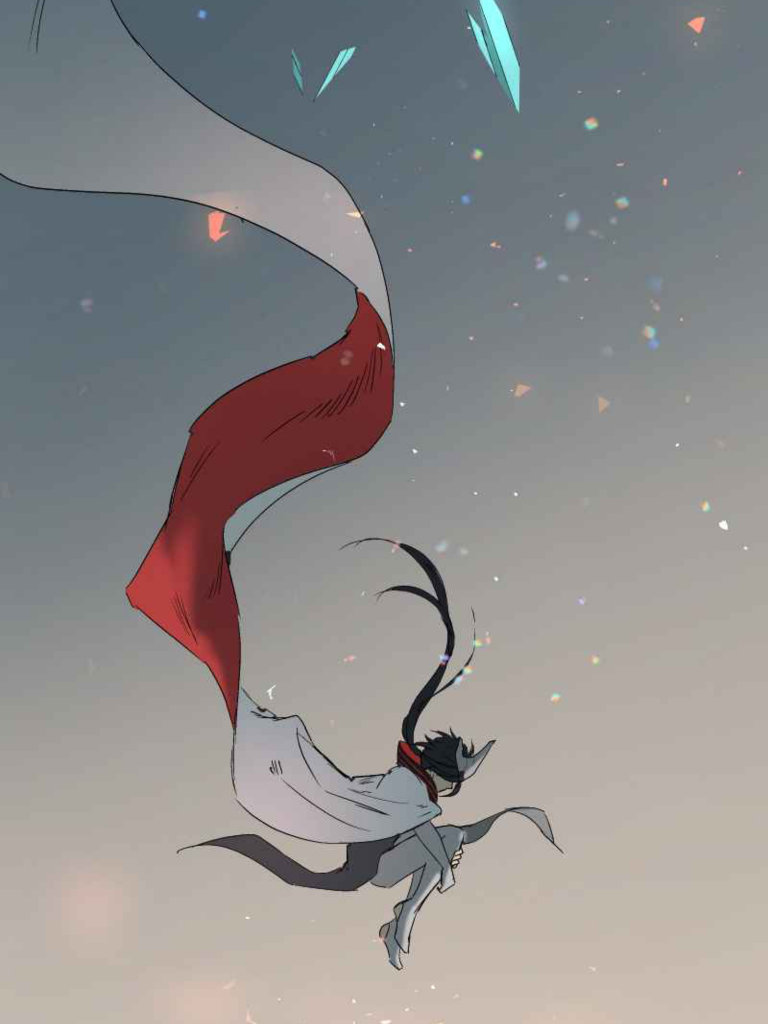


As he opens his eyes the scene switches to the final panels of the episode, we see an empire lab, a spirit coin and General Rhylus. The spirit coin implied to be Katsurou’s hums with power and then explodes the machine around it. The last panel shows General Rhylus looking at the machine, surrounded by the red glow of a spirit coin.
Conclusion
Episode forty-five is an expertly choreographed dive into Jinseis past and his mental trauma. We gain insight into who the Emperor was and what happened at the moments of his death. We might not know what he was attempting, nor why Jinsei stood against him, but we at least know the emotions that played out at his end. This is very much an episode that focuses on Jinsei and the burdens that have held him back. Jinsei’s did a lot of soul searching in this episode and came to some conclusions that I think will be key to him moving forward. Ultimately it is one of those where we will have to wait to see the ramifications.
I have to say though, I was utterly blown away by the transition and mural-like section that depicted Jinsei’s past. The colours, the imagery truly are a marvel to behold. I can say without a shadow of a doubt if ever cape of Spirits was released as a published book, I would buy it instantly.


















































